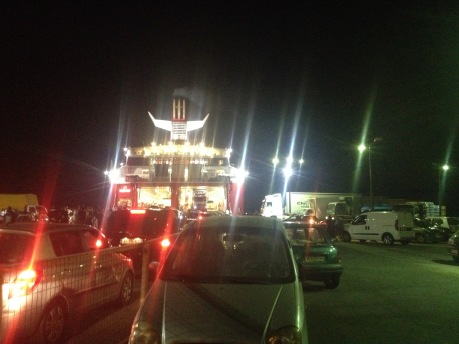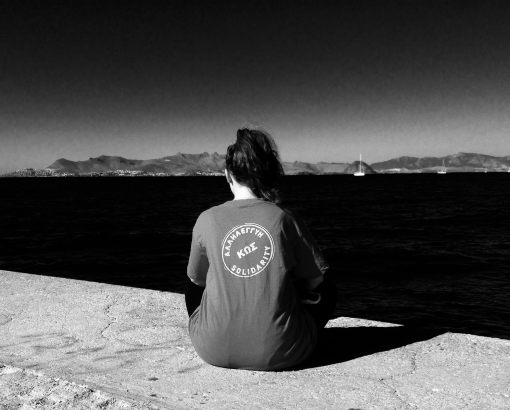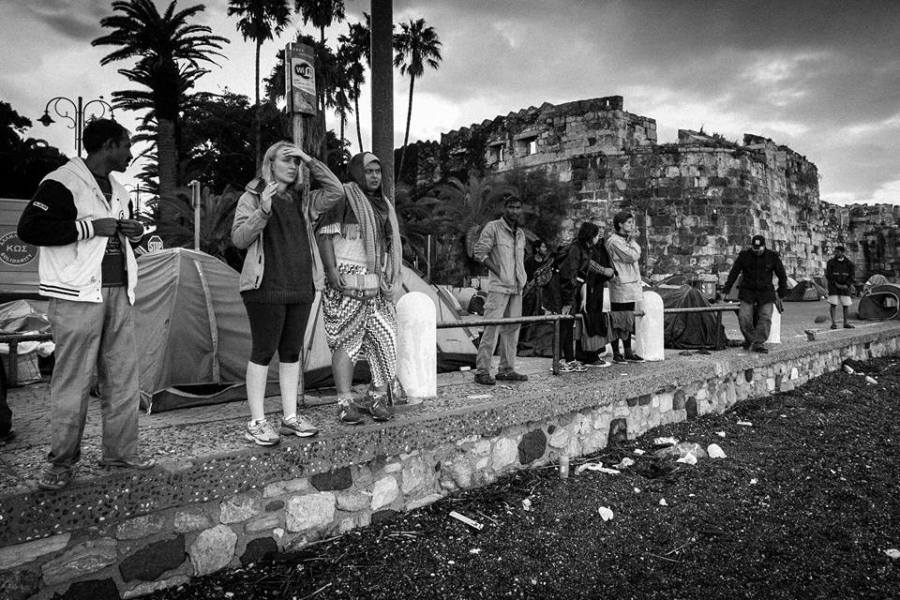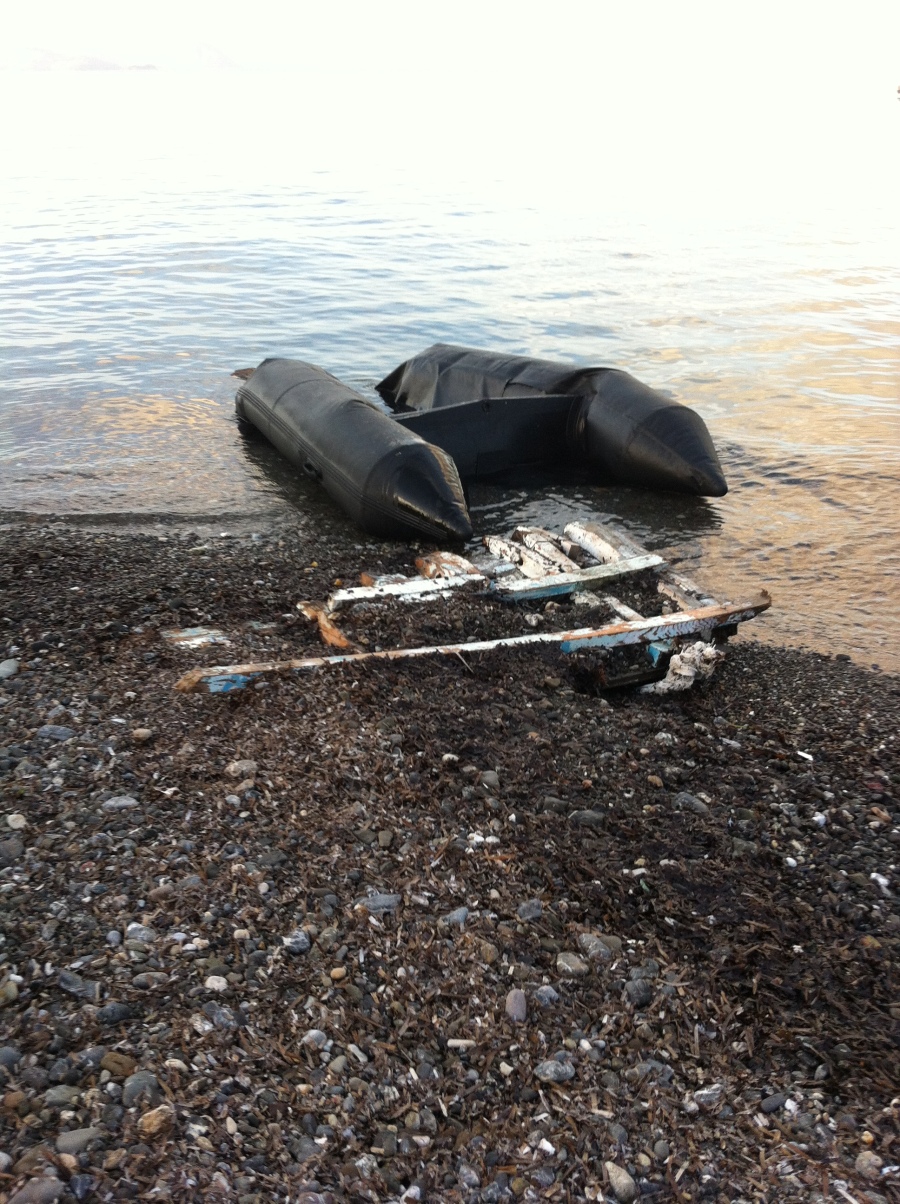One year ago today I set foot on the island of Kos for the first time. A few weeks previously I had read an article in the Daily Mail that had sickened me so much as a British Citizen that I had booked a flight to Kos, somewhat spontaneously, to try and lend a hand in whatever way I could in the refugee response. I intended to stay a week or so, and yet here I am a year later. This is the story of then and now, as I saw it, as I see it.
On the evening of September 29th 2015, a budget airline flight touched down on the tarmac of Kos airport and an anxious little red head from Scotland stumbled out. After a reasonably overpriced tourist Taxi to the main town, she found herself being welcomed by a very friendly hotelier, who advised there were many volunteers staying at his establishment and that everyone would be more than happy to help her find her feet. As she dumped her bags down in her apartment, she had just sat down upon the bed to take a breath when there was a knock at the door. She was greeted by the smiles of two fellow international volunteers, a cheery Austrian and a lovely Swede who asked if she would like to go down to the port to find out about the Night Shifts, so she would have an idea what to expect. She gladly accepted this kind offer and strolled off down to the port, with visions of headlines and horror swirling in her mind but an enthusiastic smile fixed firmly on her face. Before midnight on September 29th 2015, this girl was already searching for the victims of a possible shipwreck after an empty boat had washed up ashore. She found out the next morning the bodies of a young family had been found in the water.
From that moment on the girls life would never be the same. But this is not the story of this girl. I may be this girl but this is not my story. This is the story of Kos.
One year on since the day the girl arrived, the island is trying to move on from the events of the last year and the way they have chosen to do this is to sweep the refugees under the rug, wipe away any evidence of what happened here and do as much as possible to make the issues disappear, out of sight, out of mind.
Here are the pictures of now with the stories of then, although you may not see anything now, this story should not be forgotten.
THE PORT
One year ago today, this stretch was the very public face of the refugee crisis in Kos. Tent’s lined these streets, filled with people who had made the journey across the sea from Bodrum to Kos. There were never enough tents so many simply slept on the streets. In the mornings, lines of people could be seen waiting for something to eat, the local baker would open the back of a truck and give whatever he had. Solidarity would be there with boxes of donated breakfasts visiting the tents and making sure everyone had something to eat. In September on any given day there could be anything from 500-1000 making the port their temporary home, in the previous months this number was much greater.
In the evenings Solidarity volunteers would again be there for food distribution, handing out sandwiches which they had prepared during the day. It wasn’t much, but it was something and of course it wasn’t all about handing out food, it was about the human connection. There was always a laugh and a joke, some terrible attempts at learning Arabic, Urdu or Farsi and the general feeling that we were all in this together in the real spirit of solidarity. It was not the charity of giving to the poor, it was sharing what we had with those that in need but on a level, as an equal with mutual respect and dignity.
And when the sun went down, the arrivals would begin. Groups of volunteers would gather around big plastic bags filled with donated clothes and blankets, biscuits and water and would wait patiently to welcome people to Europe. Volunteers were the first point of contact. The boats did not arrive here, generally, they would arrive at two beaches, both approx 5 km from this point. From the shore the people had to walk to the port to register, this is why the volunteer base was here as a central point, but volunteers were also at the beaches on patrol or to try and give lifts to the most vulnerable, the injured and the old that could not walk the 5km to the town. There was no support from the government, there was no on the ground support from NGO’s overnight. The first and only response at this point was from the volunteers.
Many people arrived with nothing but the clothes they stood in, many of those clothes were completely soaked through from the sea. Volunteers had little to offer, but the most important thing they had was humanity. All night, every night they were there, with a smile in the darkness.
THE PARK (THE JUNGLE)
Here today stands an Archaeological park but one year ago today this was a makeshift refugee camp which was home for the majority of the single men. MSF (Medicins Sans Frontiers) erected large tents which were designed to hold around 30 people but they were overcrowded with many, many more as there were simply not enough shelters. There were very basic facilities available in the park such as toilets and showers, not enough for the number of people residing there but MSF tried their best to provide what they could in a hostile political situation with a very, very unsupportive Mayor.
The park was also where lunch would be served, hot meals were prepared by a small German volunteer group who fundraised to have a local hotel prepare food daily. All food distributions were carried out by volunteers and usually a couple of refugees volunteering their translation skills as at this point there was no translation service or staff available outside of the UNHCR asylum law advisors who worked within the police station.
The jungle was not a pleasant place to be, after a few busy nights it could become extremely overcrowded and the mix of nationalities and cultures being forced into such close proximity with issues like food shortages, clothing shortages and many having to go barefoot due to limited donations, created tensions.
THE POLICE STATION
Outside now everything seems calm and quiet but one year ago today, at any given moment, hundreds of people could be seen waiting outside for the next steps of their registration process so that they could move on to the next stage of their journey.
The registration had three stages. Firstly when someone arrived in the night from a boat they had to register before 5am to take the first registration document with their number which was generally referred to as the “small paper.” Once they had this they had to wait anything from 24 hours to 4/5 days depending on how busy the island had been for arrivals, to have a formal meeting within the police station to take the “big paper.” The names and numbers would be put up on a board every day outside the station to see who would be able to take their paper that day, some people had to wait longer than others and although it was denied officially there was a hierarchy of nationalities which upset many people. The “big paper” then allowed the people to leave the island, providing they had the funds for the rest of their journey. The ferry to Athens left daily and cost around 54 Euros.
One year ago today this police station was also home to unaccompanied children who were locked up in dirty cells without adequate food or sanitation with adult prisoners. The human rights violations that were committed within these walls were so great it is almost impossible to believe it really happened in a European country in 2015.
THE LIGHTHOUSE

Now this lighthouse is exactly what is has always been, a lighthouse on a picturesque coastline but one year ago today this was beacon which led the way for many across the Aegean sea. The distance is not far from Bodrum in Turkey to Kos, at it’s closest point it is around 6km.
On this day, one year ago, this coastline was scattered with life jackets, many of which were fake, manufactured in an illegal factory and when cut open could be found to contain materials such as straw and paper.
In Turkey, the people would pay their smuggler anything from 800 to thousands of Euro’s, then some were given life jackets, some were real, some were fake and then they would be sent of on their journey usually headed towards the light of this lighthouse. Some smugglers drove the bigger, more expensive and safer boats across, would throw the people out somewhere near the coast so as not to get caught and would then head back for the next trip. The smaller boats and dinghy’s were usually driven by a reluctant refugee, many of whom had no experience of powering a boat. The boats were of such bad quality many engines broke down before they reached the shore and people had to try to paddle or would float in the sea for many, many hours before they found help. Sadly we are all too aware of what happened to the many boats which could not withstand the journey and sunk on the way, even in such a short stretch of water so, so many lives were lost.
When the boats did make it to the Lighthouse, they were usually greeted by a line of cars from independent volunteers and groups who wanted to provide the first response. The beach here is not particularly rocky like the televised scenes in Lesvos so there was rarely ever a need for anyone to have to go into the water to guide the boats in. People would wait in their cars with binoculars to try and spot any incoming boats and then would prepare some blankets, water and possibly high energy biscuits. When the boats landed on the shore they would check everyone was OK and then guide them to the registration point at the port.
This was a very emotional time for many refugees as they first set foot in Europe, there were many tears, many smiles, many hugs and religious gesturing. This was also a very popular place for photographers and journalists as upon the beach there was real human emotion in it’s purest, rawest form.
THE FERRY DEPARTURE

This busy ferry port was witness to some of the most moving moments for many volunteers on the island. Every evening this was a place which was charged with emotion and the hussle and bussle of people preparing to take the next steps towards their new lives.
Solidarity was there every evening distributing warm jackets, good quality shoes and backpacks for the long journey ahead of those leaving the island, many of whom were heading across Europe to Germany.
After the chaos of the last minute distributions, this was where many people bid farewell to those they had met as they first arrived in Europe. In the few days people waited on their registration it was very easy to build friendships and the ferry farewell was always a very bittersweet moment. Families which had first been met after the trauma of the sea, could now be seen smiling and excited about their new life, their new start, but many of us knew that the journey after Kos was not an easy one and that although we were happy to share their smiles we worried that the dream of Europe was not the reality they were about to face.
As the ferry departed, everyone stood on the top deck and shone out a light in the darkness from their phones out to wave goodbye.
This was a year ago today when hope still existed on the Aegean Islands.
NOW – THE REALITY OF EU FUNDED “HOTSPOTS”
On September 29th 2016, today, the situation for refugees has changed dramatically since last year. Over the course of the last year, borders slammed shut, governments built walls and fences, dodgy deals were made, propaganda ran riot and in the middle of all of this the humanity was lost, those who the consequences would affect the most were forgotten about.
This is now the reality in for refugees in Kos. The EU funded “hotspot” which promised a safe, short term home to those trying to seek asylum in Europe, but in reality, it opened as an under funded (who knows where the money went), unsafe, long term detention centre for anyone who arrived on these shores. Originally built with the capacity to house 800 people, this facility currently has approx 1300 residents, around 1000 housed within the containers in the main compound and the rest in a camp outside in what was built as a staff car park but became an unsanitary mess of a camp for single men deemed as migrants. When the facility opened it was a closed detention camp, now many are free to move in and out of the facility providing their papers have gone through the registration process but with nothing to do with this free time many just wander around the roads outside of the fences during the days and then return again in the evenings. Instead of being a short stay facility, due to the sluggish asylum process in Greece, many have been housed here for many months as no one can move on from the island. As conditions worsen and asylum claims delay and delay whilst more and more people are squeezed into this facility, it is a powder keg of tension.
Small children live behind razor wire and walk around amongst the broken windows left from fighting which happens in the nights. Unaccompanied children live in what can only be described as a cage, locked inside for “their own protection” from the rest of the residents of the camp. Pregnant women hope that their asylum process will move fast enough for them to give birth and raise their child outside of these fences but know deep down how unlikely this is in the current climate.
The facility and camp is run by the military and the police with the help of the few NGO’s willing to work inside a system such as this. Very few voluntary organisations cross the gates of this place and those who do generally wish they had not. There is no humanity and there is definitely no solidarity.
Few staff members try to do their best and provide any kindness they can in this environment but they are few and far between and it is not easy in a place filled with frustration and sadness.
The people who risked everything in the rubber dinghy’s traveled to Europe for a safe life, a life they could live, being left in this limbo is not living.
Outside of the “hotspot” there are a few charity funded apartments for those who are seen as the most vulnerable but there are not enough and it is not easy on this island to find landlords willing to cooperate with refugees or NGO’s. Over 100 unaccompanied minors also live outside in supported accommodations, many of whom have been here for 6 months or more with no information about what happens next.
There is then of course the issue of the unregistered, those who manage to reach the shore without being caught by the Police and Frontex patrols who do not want to be deported so they live hidden in parks and abandoned buildings. With no place they can openly ask for help as they are illegal, they are desperate, cold and hungry and there is no one legally that can assist them. This is a very worrying consequence of the EU Turkey deal.
The Refugee Crisis in Kos is now heard but not seen. The “hotspot” facility is many miles away from the main town in an attempt to keep the issue as hidden as possible to the outside world. The locations where the story of the last year played out have been wiped clean as if nothing ever happened. What happened here on these shores, on the ports, in the streets was far from OK, it was a terrible situation but somewhere in amongst the chaos there was an essence of human spirit and a hope for something better. Now what happens here and on the other Greek islands is nothing short of torture for those who did nothing wrong other than try to live.
I hope with all my heart that humanity is restored to these islands one day, and I hope it will be one day soon.

From Scotland with love x
Many thanks to Robert Mehlan for the Featured Image of volunteers on the port last year.





























